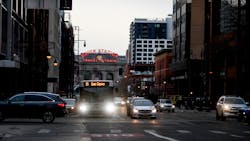Denver RTD discusses how financial impacts of COVID-10 will reshape agencies’ future transit service
The COVID-19 pandemic continues to financially impact transit agencies across the U.S.
Transit agencies across the nation, from Denver to New York to New Orleans to Los Angeles, are contemplating significant cuts and other changes to their systems as they face the realities of lost fares and shrinking sales taxes as a result of the pandemic.
San Francisco has cut half of its bus service. Seattle announced King County Metro would cut fall service by 15 percent from pre-coronavirus levels, after calculating it could lose more than $600 million in revenue through 2022. Oakland’s Alameda County is considering service cuts of up to 30 percent. And New York City is delaying hundreds of millions of dollars in subway maintenance and renovation, hoping to avoid deeper cuts that would mean losses of entire subway lines or bus routes.
The Regional Transportation District (RTD) of Denver says transit agencies that had not yet announced permanent schedule cuts over the summer were holding out for billions in renewed federal transit operating money, on top of billions in the spring CARES Act funding that kept many agencies afloat. Congress has failed to negotiate any promising agreements on a second boost for metro transit agencies, and adjourned into September without a plan.
Agencies like Denver RTD that are working through routine fall budgeting processes for 2021 spending are now forced to contemplate solving projected deficits through service cuts rather than new federal aid.
Denver RTD cut its service 40 percent during the pandemic, although tens of thousands of riders still use buses and trains every week to travel to essential in-person jobs, classes, medical appointments and other vital errands. The agency is now considering tens of millions of dollars in spending cuts and reserve-account shifts for 2021 even to keep services at that 60 percent level.
As with so many public budget discussions right now, Denver RTD’s decisions will be shaped primarily by how long COVID-19 lingers in the United States without an effective vaccine or treatment, as well as how long riders stay away from transit vehicles
“The duration of the pandemic’s public health risks will dictate whether mass transit is reshaped or whether the sector can simply afford to wait out a public health solution through the use of reserves, borrowing or intergovernmental aid,” said Todd Ely, associate professor and director of the Center for Local Government Research and Training at the University of Colorado Denver’s School of Public Affairs.
Revenue forecasts adopted by the Denver RTD Board earlier in August estimate the 2021 deficit at about $166 million in middle-case scenarios if revenue does not rise or expenses are not cut. The budget’s impact on the overall 2021 system coincides with the normal system planning process for this fall for new route schedules taking effect in January.



